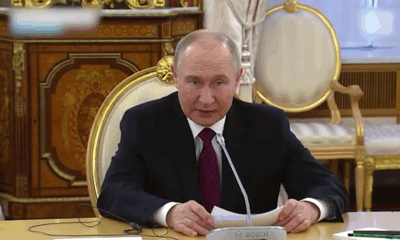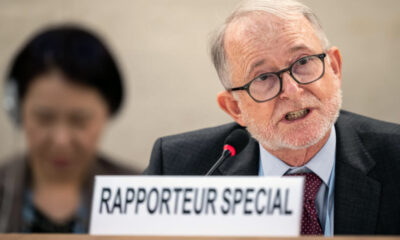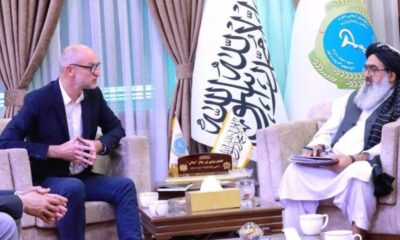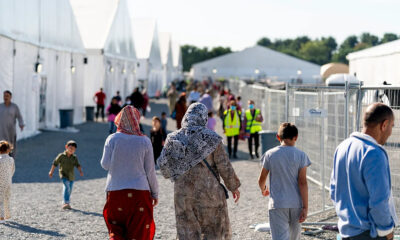World
35 killed in Gaza, 5 in Israel, as violence escalates

Hostilities between Israel and Hamas escalated on Wednesday, with at least 35 killed in Gaza and five in Israel in the most intensive aerial exchanges for years.
Israel carried out hundreds of airstrikes in Gaza into Wednesday morning, as the Islamist group and other Palestinian militants fired multiple rocket barrages at Tel Aviv and Beersheba.
One multi-story residential building in Gaza collapsed and another was heavily damaged after they were repeatedly hit by Israeli air strikes.
Israel said its jets had targeted and killed several Hamas intelligence leaders early on Wednesday. Other strikes targeted what the military said were rocket launch sites, Hamas offices and the homes of Hamas leaders.
It was the heaviest offensive between Israel and Hamas since a 2014 war in Gaza, and prompted international concern that the situation could spiral out of control.
U.N. Middle East peace envoy Tor Wennesland tweeted: “Stop the fire immediately. We’re escalating towards a full scale war. Leaders on all sides have to take the responsibility of de-escalation.
“The cost of war in Gaza is devastating & is being paid by ordinary people. UN is working w/ all sides to restore calm. Stop the violence now,” he wrote.
Gazans homes shook and the sky lit up from Israeli attacks, outgoing rockets and Israeli air defence missiles intercepting them. At least 30 explosions were heard within a matter of minutes just after dawn on Wednesday.
Israelis ran for shelters or flattened themselves on pavements in communities more than 70 km (45 miles) up the coast and into southern Israel amid sounds of explosions as interceptor missiles streaked into the sky.
In the mixed Arab-Jewish town of Lod, near Tel Aviv, two people were killed after a rocket hit a vehicle in the area. Lod and other mixed towns have been gripped by angry demonstrations over the Gaza violence and tensions in Jerusalem.
Hamas’s armed wing said it fired 210 rockets towards Beersheba and Tel Aviv in response to the bombing of the tower buildings in Gaza City. Israel’s military says that around a third of the rockets have fallen short, landing within Gaza.
For Israel, the militants’ targeting of Tel Aviv, its commercial capital, posed a new challenge in the confrontation with the Islamist Hamas group, regarded as a terrorist organisation by Israel and the United States.
The violence followed weeks of tension in Jerusalem during the Muslim fasting month of Ramadan, with clashes between Israeli police and Palestinian protesters in and around Al-Aqsa Mosque, on the compound revered by Jews as Temple Mount and by Muslims as the Noble Sanctuary.
These escalated in recent days ahead of a – now postponed – court hearing in a case that could end with Palestinian families evicted from East Jerusalem homes claimed by Jewish settlers.
Violence has also flared in the occupied West Bank, where a 26-year-old Palestinian was killed by Israeli gunfire during stone-throwing clashes in a refugee camp near the city of Hebron.
‘A VERY HEAVY PRICE’
There appeared no imminent end to the violence. Israeli Prime Minister Benjamin Netanyahu warned that militants would pay a “very heavy” price for the rockets, which reached the outskirts of Jerusalem on Monday during a holiday in Israel commemorating its capture of East Jerusalem in a 1967 war.
The outbreak of hostilities led Netanyahu’s political opponents to suspend negotiations on forming a coalition of right-wing, leftist and centre-left parties to unseat him after an inconclusive March 23 election.
Opposition leader Yair Lapid has three weeks left to establish a government, with a new election – and another chance for Netanyahu to retain power – likely if he fails.
The Arab League, some of whose members have warmed ties with Israel over the last year, accused it of “indiscriminate and irresponsible” attacks in Gaza and said it was responsible for “dangerous escalation” in Jerusalem.
Hamas named its rocket assault “Sword of Jerusalem”, seeking to marginalise Palestinian President Mahmoud Abbas and to present itself as the guardians of Palestinians in Jerusalem.
The militant group’s leader, Ismail Haniyeh, said Israel had “ignited fire in Jerusalem and Al-Aqsa and the flames extended to Gaza, therefore, it is responsible for the consequences.”
Haniyeh said that Qatar, Egypt and the United Nations had been in contact urging calm but that Hamas’s message to Israel was: “If they want to escalate, the resistance is ready, if they want to stop, the resistance is ready.”
The White House said on Tuesday that Israel had a legitimate right to defend itself from rocket attacks but applied pressure on Israel over the treatment of Palestinians, saying Jerusalem must be a place of coexistence.
The United States was delaying U.N. Security Council efforts to issue a public statement on escalating tensions because it could be harmful to behind-the-scenes efforts to end the violence, according to diplomats and a source familiar with the U.S. strategy. State Department spokesman Ned Price urged calm and “restraint on both sides”, saying: “The loss of life, the loss of Israeli life, the loss of Palestinian life, It’s something that we deeply regret.”
He added: “We are urging this message of de-escalation to see this loss of life come to an end.”
PLUMES OF BLACK SMOKE
Israel said it had sent 80 jets to bomb Gaza, and dispatched infantry and armour to reinforce the tanks already gathered on the border, evoking memories of the last Israeli ground incursion into Gaza to stop rocket attacks in 2014.
More than 2,100 Gazans were killed in the seven-week war that followed, according to the Gaza health ministry, along with 73 Israelis, and thousands of homes in Gaza were razed by Israeli forces.
Video footage on Tuesday showed three plumes of thick, black smoke rising from a 13-story Gaza residential and office block as it toppled over after being demolished by Israeli airstrikes.
The Israeli military said the building, in Gaza City’s Rimal neighbourhood, housed “multiple” Hamas offices, including ones for military research and development and military intelligence.
The existence of one Hamas office, used by political leaders and officials dealing with the news media, was widely known locally.
Residents in the block and the surrounding area had been warned to evacuate the area before the airstrike, according to witnesses and the Israeli military.
A second residential and office building in the same neighbourhood was heavily damaged in Israeli attacks shortly before 2 a.m. on Wednesday. Residents and journalists working in the building had already left.
On Tuesday Gaza health ministry officials put the death toll at 32, but a Hamas-affiliated radio station later said three more people, including a woman and a child, were killed shortly before 2 a.m. on Wednesday in an Israeli airstrike on an apartment above a restaurant.
Israeli political leaders and the military said they had killed “dozens” of militants, and hit buildings used by Hamas.
Defence Minister Benny Gantz said Israel had carried out “hundreds” of strikes, and that “buildings will continue to crumble.”
Gaza’s health ministry said that of the people reported dead, 10 were children and one was a woman.
Israel’s Magen David Adom ambulance service said a 50-year-old woman was killed when a rocket hit a building in the Tel Aviv suburb of Rishon Lezion, and that two women had been killed in rocket strikes on Ashkelon.
World
Trump starts Gulf visit in Saudi Arabia, focus on mega economic deals

U.S. President Donald Trump began a tour of wealthy Gulf states on Tuesday by visiting Saudi Arabia, with his focus on securing trillions of dollars in investments rather than security issues ranging from war in Gaza to Iran’s nuclear program.
Emerging from Air Force One, Trump punched the air in a show of solidarity when Crown Prince Mohammed bin Salman greeted him at the airport after his arrival in Riyadh with a who’s who of business leaders in tow including billionaire Elon Musk.
Trump will go on from Riyadh, which is hosting a Saudi-US Investment Forum, to Qatar on Wednesday and the United Arab Emirates on Thursday. But he has not scheduled a stop in Israel, a decision that has raised questions about where the close ally stands in Washington’s priorities.
“While energy remains a cornerstone of our relationship, the investments and business opportunities in the kingdom have expanded and multiplied many, many times over,” Saudi Investment Minister Khalid al-Falih said as he opened the forum.
“As a result … when Saudis and Americans join forces very good things happen, more often than not great things happen when those joint ventures happen,” he said before Trump’s arrival.
Trump hopes to secure trillions of dollars of investments from the Gulf oil producers. Saudi Arabia had pledged $600 billion but Trump has said he wants $1 trillion from the kingdom, one of Washington’s most important strategic partners.
The Saudi-US Investment Forum began with a video showing soaring eagles and falcons that celebrated the long history between the United States and the kingdom.
At the front of a palatial hall sat Larry Fink, the CEO of asset management firm BlackRock, Stephen A. Schwartzman, CEO of asset manager Blackstone, Treasury Secretary Scott Bessent, and Saudi Finance Minister Mohammed Al Jadaan and Falih.
Speaking at a forum panel, Fink said he had traveled to Saudi Arabia more than 65 times over 20 years. While the kingdom had been a follower when he first started visiting, it was now “taking control” and broadening its economy out of its oil base, he said.
Musk chatted briefly with both Trump and the crown prince, who is otherwise known as MbS, during a reception at a palace for the U.S. president.
MbS has focused on diversifying the kingdom’s economy in a major reform programme dubbed Vision 2030 that includes “Giga-projects” such as NEOM, a futuristic city the size of Belgium.
The kingdom has had to scale back some of its lofty ambitions as rising costs and falling oil prices weigh.
Joining Trump for a lunch with MbS are top U.S. businessmen including Musk, the Tesla and SpaceX chief, and OpenAI CEO Sam Altman.
LONG TIES BASED ON OIL AND SECURITY
Saudi Arabia and the U.S. have maintained strong ties for decades based on an ironclad arrangement in which the kingdom delivers oil and the superpower provides security.
Trump has also said he may travel on Thursday to Turkey for potential talks between Vladimir Putin and Volodymyr Zelenskiy on Russia’s war in Ukraine. An aide to Zelenskiy said the Ukrainian president would take part only if Putin does. The Russian leader has not said if he will attend, and has questioned Zelenskiy’s legitimacy.
Trump’s second foreign trip since returning to the presidency in January – his first was to Rome for Pope Francis’ funeral – comes at a time of geopolitical tension.
In addition to pressing for a settlement in Ukraine, his administration is pushing for a new aid mechanism for Gaza after 19 months of war and urging Israeli Prime Minister Benjamin Netanyahu to agree a new ceasefire deal there.
Israeli officials have put a brave face on Trump’s decision to bypass Israel during his trip but there are growing doubts in Israel about its position in his priorities as frustration mounts in Washington over the failure to end the Gaza war.
Over the weekend, U.S. and Iranian negotiators met in Oman to discuss a potential deal to curb Tehran’s nuclear program. Trump has threatened military action against Iran if diplomacy fails.
Iran’s Nournews quoted armed forces chief of staff Mohammad Bagheri as saying on Tuesday that Iran’s neighbours should retain neutrality and that any aggression against Iran would lead to definitive retaliation.
Trump is expected to offer Saudi Arabia an arms package worth more than $100 billion, sources told Reuters. This could include a range of advanced weapons.
Trump’s Middle East envoy, Steve Witkoff, said last week he expected progress imminently on expanding the Abraham Accords, a set of deals brokered by Trump in his first term by which Arab states including the UAE, Bahrain and Morocco recognised Israel.
But opposition by Netanyahu to a permanent stop to the war in Gaza or to the creation of a Palestinian state makes progress on similar talks with Riyadh unlikely, sources told Reuters.
(Reuters)
World
Trump offers to join potential Russia-Ukraine talks in Turkey
Putin and Zelenskiy have not met since December 2019 – over two years before Russia launched its full-scale invasion of Ukraine – and make no secret of their contempt for each other.
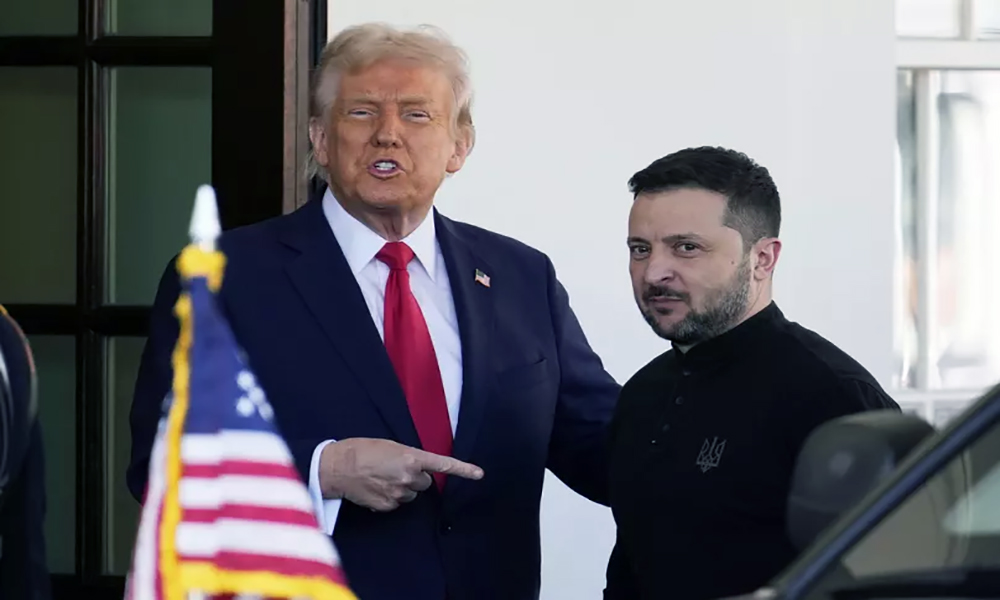
U.S. President Donald Trump offered on Monday to join prospective Ukraine-Russia talks in Turkey later this week as European countries pushed to get the Kremlin to accept their demand for a 30-day ceasefire in the war in Ukraine, Reuters reported.
Trump spoke a day after Ukrainian President Volodymyr Zelenskiy, in a fresh twist to the stop-start peace talks process, said he would travel to Istanbul where, he said, he would be waiting to meet Russian counterpart Vladimir Putin.
Trump told reporters at the White House that talks in Istanbul could be helpful and he might join them on Thursday while in the region. His current schedule has him visiting Saudi Arabia, the United Arab Emirates and Qatar this week.
“I’ve got so many meetings, but I was thinking about actually flying over there. There’s a possibility of it, I guess, if I think things can happen, but we’ve got to get it done,” he said before departing for his second foreign trip since his second term in the White House began in January, read the report.
“Don’t underestimate Thursday in Turkey,” Trump said.
Later, in his nightly video address, the Ukrainian president noted that Russian attacks had continued on the front lines throughout the day, and Moscow still had not responded to his call for Putin to meet him for talks in Turkey later in the week.
“Russian shelling and assaults continue,” Zelenskiy said. “Moscow has remained silent all day regarding the proposal for a direct meeting. A very strange silence.”
Diplomatic contacts were renewed.
Zelenskiy and Turkish President Tayyip Erdogan discussed the proposed direct talks which Zelenskiy said “may help end the war”. Erdogan described the proposed meeting as a new window of opportunity which was not to be squandered.
Russian Foreign Minister Sergei Lavrov spoke by telephone with his Turkish counterpart Hakan Fidan about Putin’s proposed talks with Ukraine on Thursday. But a brief Russian foreign ministry account gave no indication whether Putin would accept Zelenskiy’s proposal to meet him, Reuters reported.
Earlier on Monday, the German government said Europe would start preparing new sanctions against Russia unless the Kremlin by the end of the day started abiding by a 30-day ceasefire in its war with Ukraine.
Ukraine’s military said Russia had conducted dozens of attacks along the front in eastern Ukraine on Monday as well as an overnight assault using more than 100 drones, despite the ceasefire proposal by Europe and Kyiv.
“The clock is ticking,” a German government spokesperson said at a news conference in Berlin.
Russian Foreign Ministry spokeswoman Maria Zakharova said the 30-day ceasefire had been put forward by European countries “in order to provide a breather for Kyiv to restore its military potential and continue its confrontation with Russia.”
It is unclear, though, how much impact fresh European sanctions would have on Russia, especially if the United States does not join in as well.
The leaders of four major European powers travelled to Kyiv on Saturday and demanded an unconditional 30-day ceasefire from Monday. Putin, implicitly rejecting the offer, instead proposed direct Russia-Ukraine talks in Istanbul that he said could potentially lead to a ceasefire, read the report.
Putin and Zelenskiy have not met since December 2019 – over two years before Russia launched its full-scale invasion of Ukraine – and make no secret of their contempt for each other.
Responding to the ceasefire proposal, Russia said at the weekend it is committed to ending the war but that European powers were using the language of confrontation.
Ukrainian Foreign Minister Andrii Sybiha said Russia was “completely ignoring” the ceasefire initiative, citing what he said were continued attacks on Ukrainian forces.
He said he shared information about the continued fighting with European partners and U.S. Secretary of State Marco Rubio on a joint phone call. The allies had agreed sanctions would be needed to pressure Russia if it snubbed the truce move.
Russia and Ukraine are both trying to show Trump they are working towards his objective of reaching a rapid peace in Ukraine, while trying to make the other look like the spoiler to his efforts.
The Ukrainian military’s general staff said that as of 10 p.m. (1900 GMT) on Monday there had been 133 clashes with Russian forces along the front line since midnight, when the ceasefire was to have come into effect.
Ukraine’s top commander, Oleksander Syrskyi, was quoted by Zelenskiy as saying the heaviest fighting still gripped the Donetsk region, the focus of the eastern front, and Russia’s western Kursk region, nine months after Kyiv’s forces staged a cross-border incursion.
The fighting was at the same intensity it would be if there were no ceasefire, said Viktor Trehubov, a spokesperson for the military on Ukraine’s eastern front.
Kyiv is desperate to unlock more of the U.S. military backing it received from Trump’s predecessor, Joe Biden. Moscow senses an opportunity to get relief from a barrage of economic sanctions and engage with the world’s biggest economy.
World
Hamas in talks with US about Gaza ceasefire and aid, says senior Palestinian official
The U.S. had previously held discussions with the Palestinian militant group on securing the release of U.S. hostages held in Gaza, read the report.
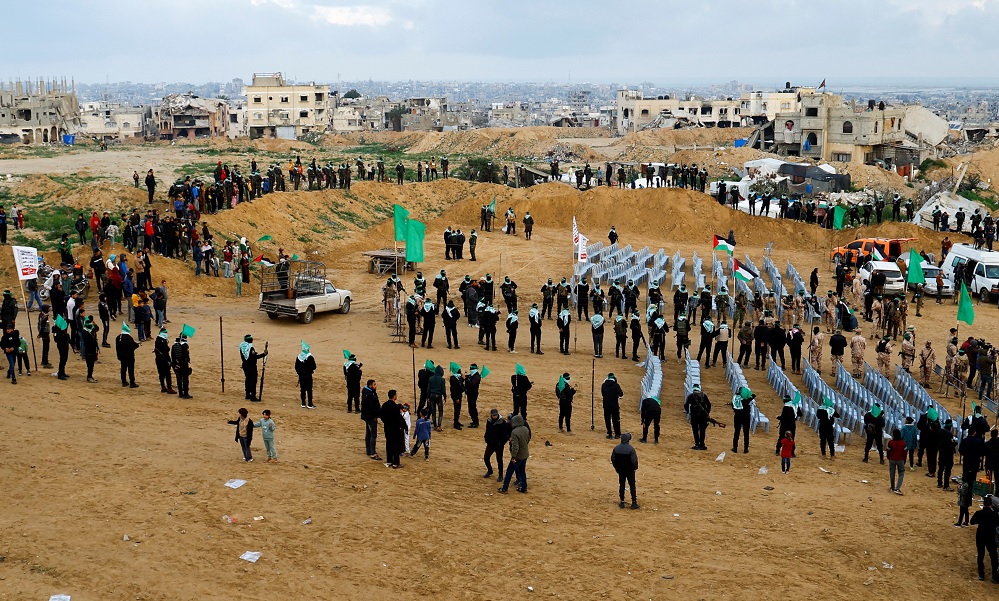
Talks between Hamas and the U.S. administration on a ceasefire in Gaza and the entry of humanitarian aid to the besieged enclave are underway, a senior Palestinian official familiar with the discussions told Reuters on Sunday.
U.S. President Donald Trump recently repeated a pledge to help get food to Palestinians in Gaza. A U.S.-backed mechanism for getting aid into Gaza should take effect soon, Washington’s envoy to Israel also said on Friday.
A State Department spokesperson said: “We cannot speak to ongoing negotiations, but I will note recent statements by Qatar and Egypt that they are continuing to engage in pursuit of an agreement.”
The spokesperson said that Hamas bore sole responsibility for the war as well as for the resumption of hostilities.
“President Trump has made clear the consequences Hamas will face if it continues to hold the hostages, including American Edan Alexander and the bodies of four Americans,” the spokesperson added.
The U.S. had previously held discussions with the Palestinian militant group on securing the release of U.S. hostages held in Gaza, read the report.
Israeli media reported on Sunday that Prime Minister Benjamin Netanyahu had told a closed session of the Foreign Affairs and Defense Committee that Hamas could soon release Alexander, an American-Israeli hostage, as a goodwill gesture towards Trump, who will visit this Middle East this week.
The prime minister’s office did not immediately respond to a request for comment on the reports.
Since March 2, Israel has cut off all supplies to the 2.3 million residents of Gaza, and food stockpiled during a ceasefire at the start of the year has all but run out.
On March 18, Israel effectively ended the January ceasefire agreement with Hamas and renewed its military campaign in Gaza, Reuters reported.
Hamas has said it is willing to free all remaining hostages seized by its gunmen in attacks on communities in southern Israel on October 7, 2023, and agree to a permanent ceasefire if Israel pulls out completely from Gaza.
Israel, vowing the war can only stop once Hamas is stamped out, has said it plans to expand its military campaign in Gaza, which has been devastated during the war and prompted warnings from the U.N. that the population faces imminent famine.
The October 2023 Hamas attacks killed 1,200 people, and 251 were taken hostage back to Gaza, according to Israeli tallies. Israel’s campaign has killed more than 52,800 Palestinians, mostly civilians, according to Hamas-run health authorities.
-

 Regional5 days ago
Regional5 days agoIndia says military stations attacked by Pakistan drones and missiles
-
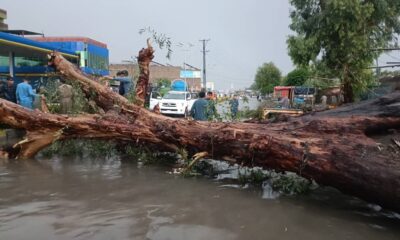
 Latest News5 days ago
Latest News5 days agoOne dead, dozens injured as powerful storm strikes Jalalabad, Afghanistan
-

 Latest News4 days ago
Latest News4 days agoEx-Afghan deputy speaker Qadeer back in Kenyan court for criminal case
-

 Health4 days ago
Health4 days agoJapanese charity Peshawar-Kai to resume leprosy treatment in Afghanistan
-

 Latest News3 days ago
Latest News3 days agoPakistan says India launched attack on Afghanistan, India denies
-

 Sport4 days ago
Sport4 days agoIndia suspends Indian Premier League T20 cricket tournament
-

 Latest News4 days ago
Latest News4 days agoMCC Chief: Afghan cadres sent to China for AI training
-

 World3 days ago
World3 days agoUS offers to help India and Pakistan start talks, G7 also urges dialogue




